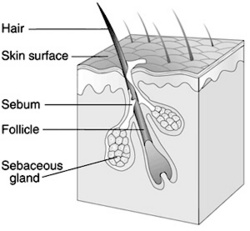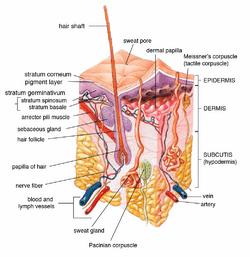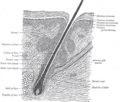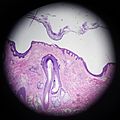Sebaceous gland facts for kids
Quick facts for kids Sebaceous gland |
|
|---|---|
 |
|
| Side view of hair follicle & sebaceous gland. | |
 |
|
| Cross-section of all skin layers. A hair follicle with connected structures. (Sebaceous glands noted at center left.) | |
| Latin | glandula sebacea |
| Gray's | subject #234 1069 |
| MeSH | Sebaceous+glands |
Your skin has tiny glands called sebaceous glands. These glands make an oily, waxy stuff called sebum. Sebum helps to keep your skin and hair soft and moisturized.
You have lots of these glands on your face and scalp. They are usually connected to hair follicles, which are like tiny pockets where hair grows. You can find sebaceous glands almost everywhere on your skin. The only places they are not found are on the palms of your hands and the soles of your feet.
There are different types of these glands. For example, in your eyelids, special sebaceous glands called meibomian glands make a kind of sebum that mixes with your tears. This helps keep your eyes moist.
Sometimes, if your skin is very oily, washing it with plain detergent can help reduce the amount of sebum. Also, using water warmer than 84 °F (29 °C) can help wash away sebum more easily.
What Do Sebaceous Glands Do?
Many people think that sebum helps stop skin from getting dry. It is also thought to make hair and skin waterproof. However, some scientists believe that having less sebaceous gland activity does not always mean dry skin. They suggest that sebum might not be as important for modern humans as we once thought.
Images for kids
-
Insertion of sebaceous glands into hair shaft
-
Sagittal section through the upper eyelid.
-
A hair follicle with associated structures
-
Scalp cross section showing hair follicle with sebaceous glands.
See also
 In Spanish: Glándula sebácea para niños
In Spanish: Glándula sebácea para niños







